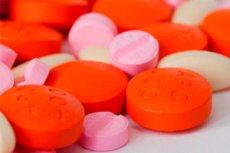Medical expert of the article
New publications
Is it okay for a nursing mom to take antibiotics?
Last reviewed: 29.06.2025

All iLive content is medically reviewed or fact checked to ensure as much factual accuracy as possible.
We have strict sourcing guidelines and only link to reputable media sites, academic research institutions and, whenever possible, medically peer reviewed studies. Note that the numbers in parentheses ([1], [2], etc.) are clickable links to these studies.
If you feel that any of our content is inaccurate, out-of-date, or otherwise questionable, please select it and press Ctrl + Enter.

Medicines that inhibit the activity of a wide range of pathogens in the body and are used in infectious and inflammatory diseases are antibiotics. The main indicators that an antibacterial agent is allowed during breastfeeding are:
- Low penetration into breast milk.
- Rapid elimination from the body.
- Lack of toxicity.
- Safety for the child.
Today on the pharmaceutical market there are many groups of antibacterial drugs. The list of those allowed during lactation includes:
- Penicillins are the first choice agents and penetrate milk in relatively low concentrations. They can cause allergic reactions in both mother and child. This group includes: Ampicillin, Ospamox, Amoxicillin, Augmentin and others.
- Cephalosporins are non-toxic, do not penetrate breast milk well and have no effect on growing children. The following may be prescribed for treatment: Cefradine, Cefuroxime, Ceftriaxone.
- Macrolides - well penetrate into the mother's milk, but do not have a negative effect on the baby. They are prescribed for patients with allergic reactions to antibiotics of the cephalosporin and penicillin series. Popular drugs: Azithromycin, Erythromycin, Clarithromycin.
Antibiotics contraindicated in breastfeeding:
- Aminoglycosides - penetrate milk in low concentrations, but have toxic effects on the kidneys and hearing organs of the baby. Prohibited include: Streptomycin, Amikacin, Kanomycin.
- Tetracyclines - penetrate into milk, negatively affect the growing body, disrupt the development of bone tissue and tooth enamel of the baby.
- Sulfonamides - negatively affect the metabolism of bilirubin in newborns, provoke nuclear jaundice.
- Fluoroquinolones - in large quantities get into mother's milk. Disrupts the development of cartilage tissue in infants.
To minimize the risk of adverse reactions from antibacterial drugs, it is forbidden to take antibiotics and any other medications on your own. All medications, their dosage and duration of therapy must be prescribed by the attending physician.
It is recommended to take the medicine during or after lactation. In this case, it is necessary to distribute the medication so that it is before the maximum interval in lactation. For example, if the medication should be taken once a day, it is better to do it during or after night feeding. Also do not forget about nighttime milk decanting, as it promotes the release of prolactin, which supports further lactation.
Can a nursing mom drink amoxicillin?
Bactericidal antibacterial agent from the pharmacological group of semi-synthetic penicillins. It has a broad spectrum of action against Gram-positive, Gram-negative and other pathogenic microorganisms.
Indications for use: bronchitis, pneumonia, pyelonephritis, urethritis, colitis, gonorrhea and other bacterial infections caused by microorganisms sensitive to the drug.
Method of administration: 500 mg 2-3 times a day. The duration of therapy is determined by the attending physician. Before starting treatment it is necessary to determine the sensitivity of pathogenic microflora to Amoxicillin.
Side effects: allergic reactions, febrile condition, joint pain, development of superinfections.
Contraindications: penicillin intolerance, infectious mononucleosis, diseases with high body temperature.
Amoxicillin is allowed for nursing mothers, as the concentration of its active components is low. Adverse reactions are extremely rare, so the risk to the infant is minimal.
Form of release: tablets of 1g, 500 and 250 mg, capsules forte, solution and suspension for oral administration, dry substance for injection in ampoules of 1 g.
Can a nursing mom drink biseptol?
Combined antibacterial agent. Contains sulfamethoxazole and trimethoprim. Exhibits high bactericidal activity against most pathogens.
After oral administration it is rapidly absorbed into the systemic bloodstream. The maximum concentration of the drug is observed in 1-3 hours and persists for 5-7 hours. Increased concentrations occur in the lungs and kidneys. Metabolized in the kidneys, excreted with urine.
- Indications: sore throat, sinusitis, otitis media, bronchitis, pleural empyema, bronchiectatic disease, lung abscess, pneumonia, urethritis, cystitis, pyelitis, chronic pyelonephritis, prostatitis, gonococcal urethritis. GI infections, surgical infections, septicemia, uncomplicated gonorrhea.
- How to use: orally 4 capsules of 480 mg (8 scoops of syrup) per day. Duration of treatment is determined by the attending physician.
- Side effects: nausea, vomiting, allergic reactions, renal disorders, leukopenia, agranulocytosis.
- Contraindications: hypersensitivity to the drug components, renal/liver dysfunction, diseases of the hematopoietic system, premature infants and newborns, pregnancy.
Biseptol is contraindicated during breastfeeding, as its active ingredients penetrate into breast milk and the infant's body. This is dangerous due to the development of adverse reactions in the infant. If the mother takes the drug, lactation is stopped for the duration of treatment.
Form of release: tablets 400 mg for 20 pieces in a package, syrup for oral administration.

